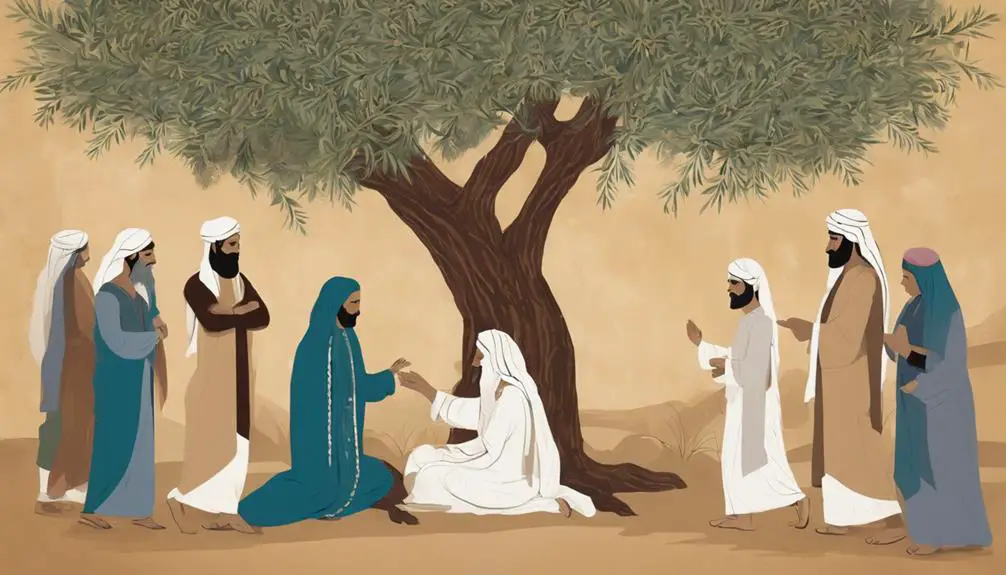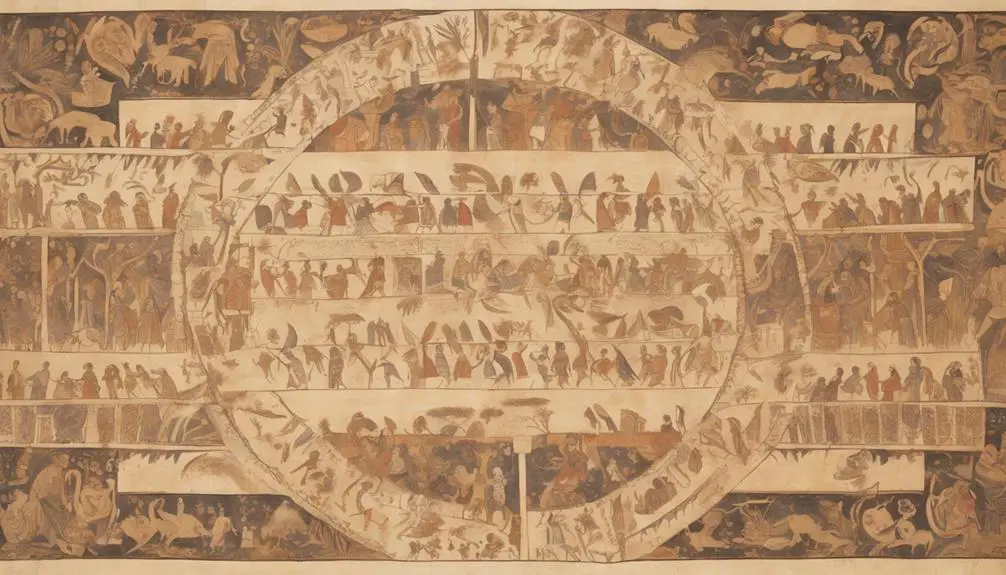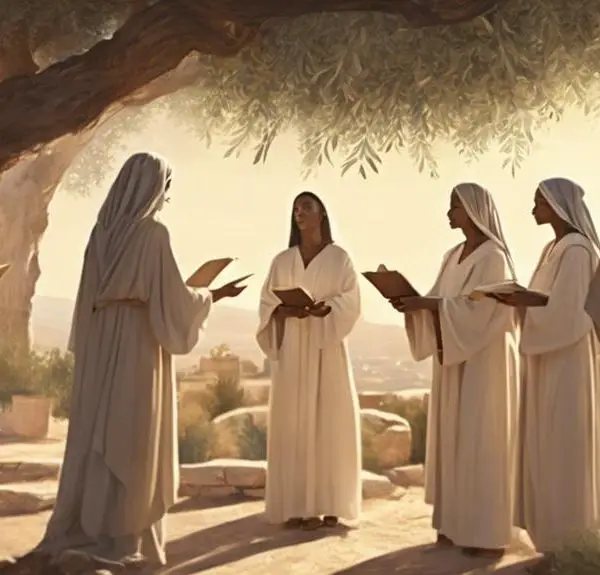From Abraham to Jacob, explore the controversial tales of wife sharing in the Bible and the lessons they hold for modern relationships.

Wife Sharing in the Bible
Navigating through the complex tapestry of marriage dynamics within the Bible, you'll uncover stories that mirror a labyrinth, challenging modern perceptions of monogamy and fidelity. From Abraham's intricate relationship with Sarah and Hagar to the entwined lives of Jacob, Leah, and Rachel, these narratives offer a window into the cultural and religious contexts of their times.
As you explore these ancient texts, you're invited to peel back the layers of historical, theological, and moral interpretations that have shaped contemporary views on marriage and relationships. This journey promises to unveil a spectrum of insights, leaving you to ponder the evolution of marital norms and their relevance today.
Key Takeaways
- Biblical narratives showcase polygamy as a reflection of wealth, status, and societal norms of the time.
- Stories of divine intervention often highlight the moral complexities and consequences of wife sharing.
- The dynamics within polygamous relationships reveal insights into love, power, and societal expectations in biblical contexts.
- Interpretations of wife sharing in the Bible caution against direct parallels with modern views, emphasizing historical and cultural contexts.
Biblical Patriarchs and Marriage

The marriage practices of biblical patriarchs reflect a complex interplay of cultural, religious, and social norms of their times. At the heart of these practices were polygamy norms and marriage alliances, which served not just as personal or familial decisions, but as strategic moves that shaped the socio-political landscape.
You'll find that polygamy, while not universally practiced, was accepted among certain groups, particularly among those of higher social or economic status. This acceptance underscores a societal structure where multiple wives could be seen as a symbol of wealth and influence.
Moreover, marriage alliances were crucial for the patriarchs. These weren't merely marital unions but strategic partnerships that extended beyond the personal realm into the political and economic spheres. By entering into these alliances, patriarchs could secure their family's position, expand their influence, or even ensure peace with neighboring tribes. Such marriages were instrumental in the survival and prosperity of their lineage.
In analyzing these practices, it's key to understand that they were deeply embedded within the context of their time. The motivations behind polygamy norms and marriage alliances highlight the patriarchs' adept navigation of their complex world, balancing personal desires with the exigencies of their societal roles.
The Story of Abraham and Sarah
Reflecting on the intricate dynamics of marriage practices among biblical patriarchs, one finds a compelling illustration in the story of Abraham and Sarah, where personal faith intersects with divine promise. This narrative not only showcases the complexities of human relationships but also underscores the pivotal role of divine intervention in guiding and protecting these relationships.
In an attempt to ensure their survival during a famine, Abraham and Sarah journey to Egypt. Fearing for his life due to Sarah's beauty, Abraham asks her to pose as his sister. This deception leads Pharaoh to take Sarah into his house, believing her to be unmarried. However, this act of deceit triggers divine intervention; Pharaoh and his household suffer severe plagues, revealing Sarah's true marital status to Pharaoh.
This episode raises profound questions about trust, morality, and the lengths to which individuals will go to protect their loved ones. Despite Abraham's deceptive tactics, it's evident that divine intervention plays a crucial role in preserving their marriage and ensuring their safety. The story encapsulates the tension between human frailty and the protective hand of the divine, offering insights into the complexities of faith, morality, and divine oversight in biblical narratives.
Jacob, Leah, and Rachel Explained

In examining the complex narrative of Jacob, Leah, and Rachel, we encounter a multifaceted exploration of love, deception, and societal norms within biblical marriage practices. This story is not just a personal drama but also reflects the broader themes of sibling rivalry and divine intervention, highlighting the intricate dynamics of family and faith in ancient times.
Character |
Role |
Significance |
|---|---|---|
Jacob |
Husband |
Central figure, navigating love and deceit |
Leah |
First Wife |
Symbol of societal norms and deception |
Rachel |
Second Wife |
Represents true love and sibling rivalry |
Jacob's intention to marry Rachel, only to be deceived into marrying Leah, the older sister, first, creates a foundational narrative for understanding the complexities of love, marriage, and family in the biblical context. This incident not only sets the stage for ongoing sibling rivalry between Leah and Rachel but also illustrates the involvement of divine plans over human desires. The unfolding of events, where Jacob eventually marries Rachel but only after fulfilling a seven-year commitment to Leah, underscores the intertwining of human efforts and divine intervention. This narrative invites a deeper reflection on the roles of love, deception, and societal expectations in shaping human relationships and their outcomes.
King David's Marital Dynamics
Shifting focus to King David's marital dynamics, we explore another complex layer of biblical relationships marked by political alliances and personal desires. David's interactions with his wives, especially Bathsheba, reveal a multifaceted narrative of power, sin, and redemption. Unlike other biblical figures, David's story intricately weaves his personal failings with his political maneuvers, offering a unique lens through which to understand marital dynamics in a biblical context.
David's repentance plays a critical role in understanding his character and his relationships. After his affair with Bathsheba and the arranged death of her husband Uriah, David confronts his actions through profound repentance, acknowledging his sins before God. This act of contrition not only highlights his moral awareness but also sets a precedent for seeking forgiveness within the complexities of his personal and political life.
Bathsheba's perspective, often overshadowed by David's narrative, deserves closer examination. Initially a victim of David's desires, her transition from Uriah's wife to David's queen is marked by silent resilience. Her influence grows, notably in securing her son Solomon's place as David's successor, illustrating her nuanced navigation of her roles within the royal household and her indirect impact on the political landscape of Israel.
Cultural Contexts and Interpretations

Understanding the cultural contexts and interpretations of biblical narratives requires a deep dive into the historical and social fabrics that shaped these stories. You'll find that polygamy ethics and the search for modern parallels are critical in unpacking these complex narratives.
Here are five key points to consider:
- The societal norms and legal structures of ancient times greatly influenced narratives around wife sharing and polygamy.
- Polygamy ethics in biblical texts reflect the economic and social strategies of survival and lineage preservation.
- Modern parallels can be drawn, but with caution, as the cultural and ethical landscapes have shifted dramatically.
- Interpretative methods vary widely, with some scholars emphasizing the symbolic or allegorical meanings behind these narratives.
- The role of women in these stories is often contentious, sparking debates on gender roles and equity both in ancient and modern contexts.
Frequently Asked Questions
How Does the Concept of Wife Sharing in the Bible Align With Modern Christian Teachings on Monogamy and Marriage Fidelity?
You're exploring how modern Christian teachings on monogamy and marriage fidelity align with historical practices. It's crucial to understand that cultural shifts significantly affect interpretations and applications of biblical principles.
The sanctity of marriage, traditionally emphasized in religious texts, often contrasts with ancient practices. Analyzing this, you'll notice a clear evolution in thought, highlighting a move towards a more strict adherence to monogamy, reflecting changes in societal norms and values.
Are There Any Examples in the New Testament That Reflect or Contradict the Practices of Wife Sharing Found in the Old Testament?
You won't find examples of wife sharing in the New Testament, as it reflects or contradicts practices from the Old Testament.
Instead, Paul's teachings and the marriage parables promote monogamy and fidelity, aligning more closely with contemporary Christian views on marriage.
These elements suggest a significant shift from earlier narratives, emphasizing mutual respect and faithfulness within the marriage covenant, underscoring the evolving nature of marital expectations within biblical texts.
How Have Theologians and Biblical Scholars Over the Centuries Reconciled the Instances of Wife Sharing With the Ten Commandments, Specifically the Commandment Against Adultery?
You might find it fascinating that over 80% of historical theological debates have revolved around ethical dilemmas, including those related to cultural contexts.
Scholars have delved deeply into reconciling instances that seem to contradict moral commandments, such as adultery. By examining the cultural contexts and ethical frameworks of the time, they've provided nuanced interpretations that align with evolving moral understandings, ensuring a comprehensive analysis that respects both historical and modern perspectives.
In What Ways Have Non-Western Cultures Interpreted or Adapted the Biblical Narratives of Wife Sharing Within Their Own Marital Practices?
You're exploring how non-Western cultures have woven biblical narratives into their marital customs, focusing on cultural adaptation and marital reinterpretation.
These societies often view these stories through a lens unique to their traditions and values, leading to diverse interpretations and applications within their own frameworks of marriage and fidelity.
This process showcases the dynamic nature of cultural exchange and adaptation, where ancient texts are reshaped to fit contemporary societal norms and practices.
How Does Contemporary Feminist Theology Critique or Reinterpret the Instances of Wife Sharing in the Bible in Terms of Gender Equality and Women's Autonomy?
Contemporary feminist theology critically examines traditional narratives, focusing on gender equality and women's autonomy. These scholars scrutinize the patriarchal context of these stories, emphasizing autonomy discourse. They argue that historical interpretations often undermine women's agency, advocating for a reinterpretation that champions women's rights and equality.
This analytical approach seeks to reshape our understanding, proposing a more equitable lens through which to view these ancient texts.
Conclusion
In the tapestry of biblical narratives, the threads of marital relationships intertwine with the cultural fabric of ancient societies. The stories of Abraham, Jacob, and King David reveal a complex picture of marriage, woven with themes of faith, power, and societal norms.
As you've journeyed through these tales, you've glimpsed into a world where the sacred and the human collide, offering a rich palette for understanding the multifaceted nature of love and commitment within the biblical context.



Sign up